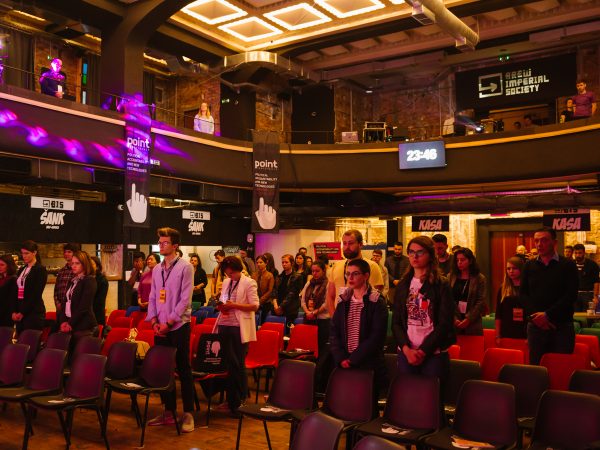Killed in Egypt to Live Forever
The last panel of the second day of POINT 8.0 was special as the name and face of the Egyptian speaker was hidden for security reasons and for that purpose we called Azra Tatarevic.

Photos by: Vanja Čerimagić
The speaker started her intervention with telling the audience about victims from different sex, age, and nationality that were killed in Egypt like Mariem was a student watching the demonstrations of january revolution and was shot dead by police along with other 664 egyptian were killed at the same time or Kareem khozam who was killed at the age of 19 in the stadium during port said massacre along with 74 others who were killed with him or Mohamed Deb who was killed at the age of 27 in Abu Zaabal prison along with 37 others. The audience were touched by each and every case reviewed by Azra like the case of Shaima Alsabbagh who was killed in 2015 in Etahrir square while commemorating the revolution or Mohamed Abdel Kreem was killed at the age of 22 just because he refused to present an ID to a police officer in 2018. Azra also mentioned that extrajudicial killing targeted also internationals like Mick Deane who was killed at the age of 61 during Rabaa massacre and Guilio Regeni who was killed at the age of 28 while he was working on a study for his university and his dead body had multiple evidences of torture.
The project “Killed in Egypt” is a platform to commemorate the death of every story and to honor those who were killed in Egypt.
The initiative “killed in Egypt” is based on documenting the extrajudicial killings in Egypt since 2011, telling the stories of the victims, humanize the lives behind the numbers and putting pressure on the government to stop the systematic practice. The initiative also is based on seeking truth, justice, and accountability for the victims in addition to denouncing violent solutions for political conflicts.
Politically neutral Egyptians as well as non Egyptians adopted the idea and supported it
Azra discussed the Methodology of the project that is collecting data, fact checking, creating the database, collecting stories, and interviewing families.
According to Azra, the project has the most massive information about extrajudicial killing since 2011 as its database includes more than 2000 victims and more than 100 stories.
Azra also highlighted the importance of this project as forgetting crimes makes them easy to be repeated and using just numbers make it as if it is normal thing to happen in Egypt, not to mention that the regime in Egypt is afraid from media and truth and Azra and her friends are determined to make this their nightmare. Through telling the victims stories, Azra endeavoured to save new lives.
The Egyptian speaker enumerated her expectation for the next 5 years and she asked the audience for help by reading the stories and publish them , spreading the word about the initiative , joining her efforts, donation , and to connect with the initiative for any kind of support.
Azra stressed that she wants recognition and that she wants to honor the victims which is her objective in addition to holding the Egyptian government accountable.
Azra at the ends mentioned the challenges that she is facing among which the security risk that even scares the stakeholder.
The panel touched many of the audience especially those who came from conflict zones or post conflict zones who are familiar with extrajudicial killings.
Watch the full video: